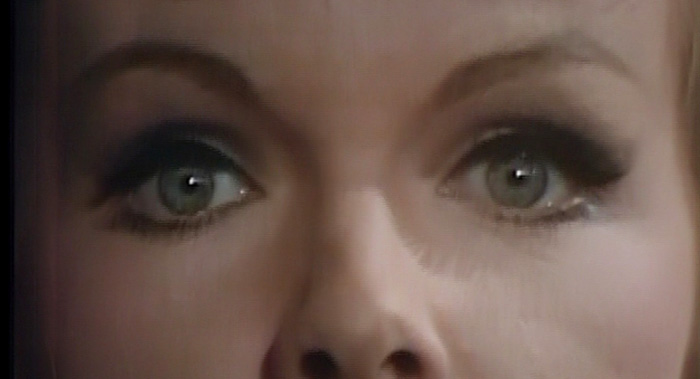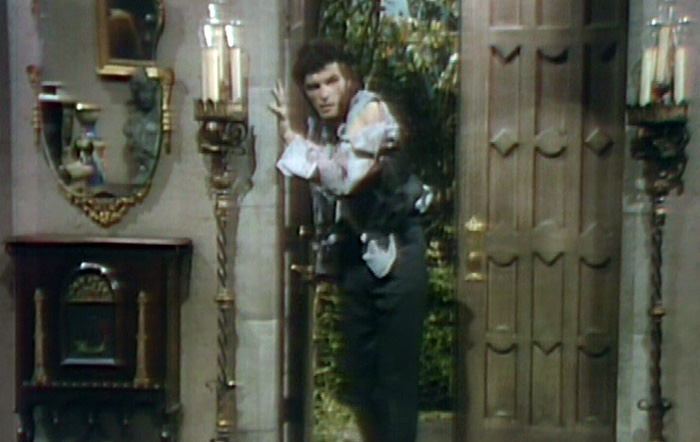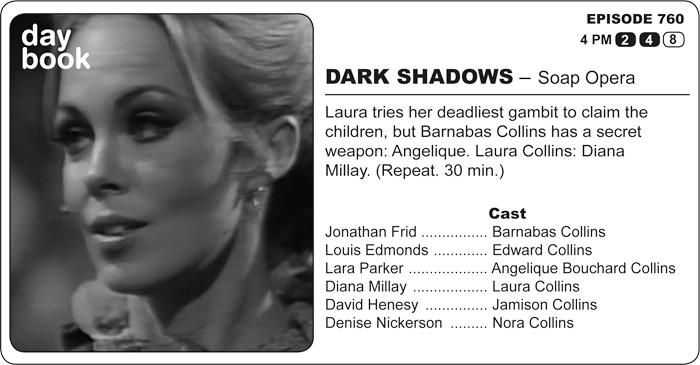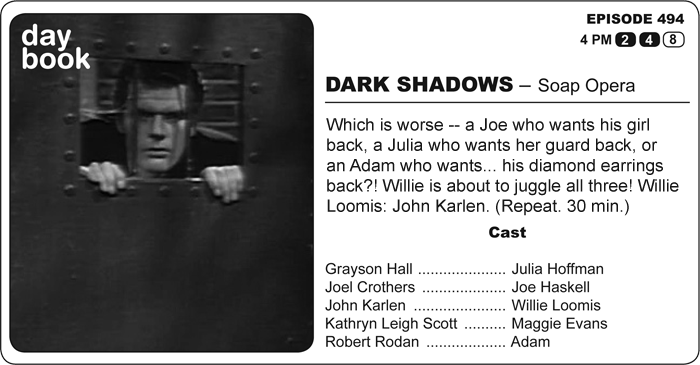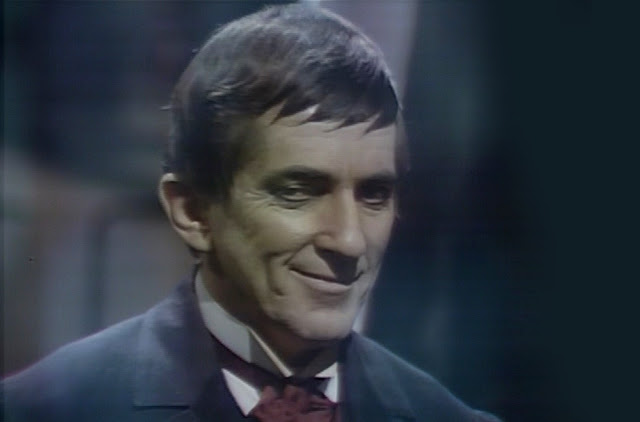
By PATRICK McCRAY
Taped on this date in 1969: Episode 759
With Angelique destroyed, Barnabas stands alone in the last stand against a pagan fire god…or does he? Barnabas: Jonathan Frid. (Repeat; 30 min.)
After Angelique vanishes from Laura’s attack, Barnabas awakens to learn that she knows his secret. He attacks Dirk, placing him under vampiric control, taking him from Laura. She learns this after gloating over her knowledge of Barnabas and the recollection of her relationship with him when she tortured his uncle in the 1700’s. Going upstairs to gather Jamison, she finds that he is a decoy of stuffed pillows and that Angelique is alive and ready for action. Barnabas smiles broadly as Laura’s world crumbles.
Robert Cobert? You have the day off. Some times, like weddings and coronations, there is only one man to compose the proper music. In the case of 759, that man is Mike Post and Pete Carpenter. This episode lunges from the coffin, grabs art by the collar, and demands it. The only things missing are a jerry-rigged cabbage cannon, Szandor being drugged to the point where he’s not afraid to fly, and Barnabas lighting a cigar while loving it when a plan comes together. I suspect he even had Magda paint a red, diagonal stripe up the side of his coffin while he worked as a soldier of fortune in the LA underground. Make no mistake; this great episode of Dark Shadows does not look like an installment of The A-Team. It makes a great episode of The A-Team look like an installment of Dark Shadows. Get it straight.
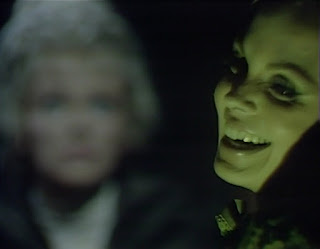 With Jonathan Frid and Lara Parker, this much fun just can’t be legal. And what a way to kick off summer vacation for the kids. If I had been a ten year-old fan of the original run when this episode hit, you’d have needed a diamond-edged spatula to pry me off the ceiling. You may need one now. Outside of the sentimental moments of the bonding and friendship and alienation and loneliness that defined the series, storytelling like this defines why Dark Shadows is so watchable.
With Jonathan Frid and Lara Parker, this much fun just can’t be legal. And what a way to kick off summer vacation for the kids. If I had been a ten year-old fan of the original run when this episode hit, you’d have needed a diamond-edged spatula to pry me off the ceiling. You may need one now. Outside of the sentimental moments of the bonding and friendship and alienation and loneliness that defined the series, storytelling like this defines why Dark Shadows is so watchable.Like that time when he reveals the fate of Dirk Wilkins. And just stares at Laura as she finally realizes that she has no monopoly on mind control. Nor on a cruel disregard for the “sanctity” of human life.
To me, these moments -- are the absolute apex of Barnabas before his second fall and subsequent rise as the battlescarred, weary hero of 1840. He is so accustomed to being one step behind. Reacting only. Making decisions based on desperation and panic. 1897 -- specifically, this part of 1897 -- is his most heartening and endearing phase. Not only does he outwit Laura, but he does so while acknowledging their long, mutual history. She savors the fact that she has him in her power and has done so since he was a child. A little boy in love. Powerless to save his uncle from a doomed relationship. Creating the pattern that would make Jeremiah’s union with Josette just… plausible… enough. Barnabas always had to suspect that Angelique’s spell wasn’t the only thing driving his uncle.
The pleasure of his revenge is the pleasure of playing a game better than its ostensible master. Laura’s talents are for misdirection, a cultivated knack for being underestimated, and zero care for the lives of humans as she pursues her goals. Burn a kid. Release the worst in Dirk. She is the occult equivalent of Trask. There is no line between malicious madness and religious faith. Angelique may be a creature of the occult, but Barnabas is her higher power. Satan is just how she gets there. With Laura and Ra, it’s impossible to determine if she harms in service of Ra or if service to Ra excuses her bloodlust. Either way, Barnabas has seen too many people get the Ra deal, including Roger, Victoria, and David if he asked around upon his release.
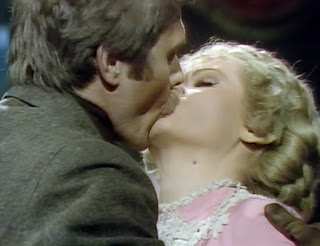 Although they don’t celebrate victory with fist bumping and curling up in front of the latest episode of Fireplace!, we still get a true sense of how Barnabas and Angelique are an inevitable couple. This is a multiphasic collaboration of totally unnecessary set-ups and knock-downs designed not only to defeat Laura, but to humiliate her in a final blow for humanity. To send her back to the Egyptian underworld with no uncertainty that she is a ham-fisted amatuer in the occult cruelty department, and will never be better than second rate. Laura’s an immortal. Maybe a demigod. So there’s no true getting rid of her, and corporeal dissolution isn’t going to teach the lesson she needs. Laura needs the closest they can get to a prom night-sized bucket of pig’s blood, and that’s what she gets. It’s the kind of vengeful pedagogy that Barnabas can’t teach alone. He needs Angelique’s reassuring edge to overcome both his self-doubt and the distracting need to jump to Magda and Szandor as the next thing on his to-do list. Fortunately, he has Angelique in his corner at last, which is right where she wants him. Perhaps his eventual show of confidence in her in 1840 is his way of saying thanks. There are more ways to answer “I love you” than saying, “I know.”
Although they don’t celebrate victory with fist bumping and curling up in front of the latest episode of Fireplace!, we still get a true sense of how Barnabas and Angelique are an inevitable couple. This is a multiphasic collaboration of totally unnecessary set-ups and knock-downs designed not only to defeat Laura, but to humiliate her in a final blow for humanity. To send her back to the Egyptian underworld with no uncertainty that she is a ham-fisted amatuer in the occult cruelty department, and will never be better than second rate. Laura’s an immortal. Maybe a demigod. So there’s no true getting rid of her, and corporeal dissolution isn’t going to teach the lesson she needs. Laura needs the closest they can get to a prom night-sized bucket of pig’s blood, and that’s what she gets. It’s the kind of vengeful pedagogy that Barnabas can’t teach alone. He needs Angelique’s reassuring edge to overcome both his self-doubt and the distracting need to jump to Magda and Szandor as the next thing on his to-do list. Fortunately, he has Angelique in his corner at last, which is right where she wants him. Perhaps his eventual show of confidence in her in 1840 is his way of saying thanks. There are more ways to answer “I love you” than saying, “I know.”How much does an imperfect man need to pay just to squeeze his way into purgatory? For Barnabas Collins, is it ever quite enough? Roger will get away with it. Whatever “it” is. Saint Joe Haskell, certainly. Poor guy. But no matter what Barnabas does, it may never be enough. There will always be new clauses to curses and further Trasks awaiting him in any decade.
It’s a troubling story if that’s the point. And it may be. But the point is not for Barnabas. It’s for us. Like everything on this show of outsiders, it’s to remind us, fellow outsiders, that we’re not alone. To reassure us of this when life throws us a Trask, life will also throw us a Roger Davis as our new familiar. Neither states are permanent. And that’s the good news. The only thing permanent is our potential for greatness. When he is later knocked down by the Leviathans, Parallel Time, and Gerard, it has increased resonance because we remember — even when he may not — what he has within him.
But for now? All of that matters for the series and none of that matters for the present. The only thing that counts in this moment is that Barnabas really, authentically smiles for the second of two times in the series. It’s a great smile.
The plan has come together. And that is just as much fun as it sounds.
This episode hit the airwaves May 22, 1969.

